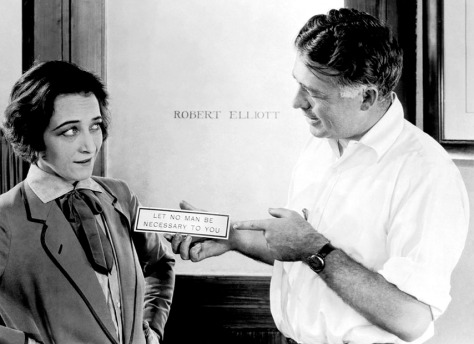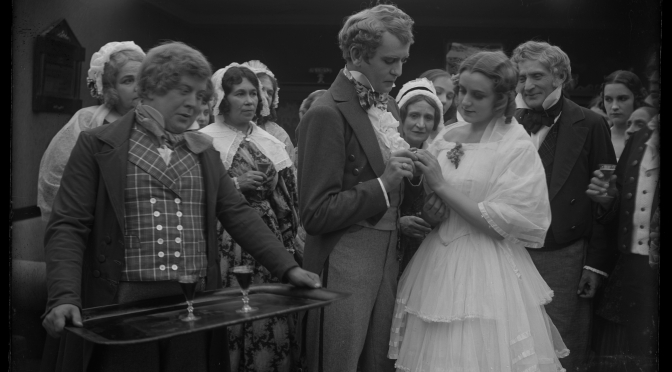As the great sage Rachel Bloom has pointed out, the mathematics of love triangles isn’t hard to learn. But what happens when one of the angles in the love triangle is so very much more acute than all the others? Which is to say, age ain’t nothing but a number, but some numbers are certainly far higher than others. And we learned a lot about May-December relationships at the Giornate this morning.
First, the sweetly pretty Swedish film Dunungen (1919), in which a young lady known as Downy (yes, I know, I tried to swap in Fluffkins to make sense of it as a nickname) gets engaged to a fancy dude who is actually the mayor’s son. And she is just the baker’s daughter so she should be grateful right? Well despite her disadvantages he takes her along to go butter up his uncle for an inheritance. Uncle has a big ironworks business and a country estate, and maybe, just maybe he likes Fluffkins more than her rubbish fiancé does. Perhaps they should be together and live happily in rural bliss. Well, it takes some elongated shenanigans and many beautifully hand-drawn folk art intertitles to get there, but yes, she swaps her immature snob for a classy chap who knows what he wants out of life eventually. This was a treat, a film from the Scandinavian Challenge strand that has had a little resto work to fill in the missing reels. It’s gorgeous and funny and spins out its domestic drama until the conclusion feels fully earned.

The second exhibit in our age-gap affair investigation is Smouldering Fires (Clarence Brown, 1925), a film I have long wanted to see, and presented here as part of Kevin Brownlow’s Parade’s Gone by segment. You can’t go wrong with Clarence Brown, and here Pauline Frederick is wonderful as Jane Vale, the fortysomething boss of a massive textile factory who falls for a young and dishy employee, Robert (Malcolm McGregor). Can an older woman and a younger man find happiness together? Need you ask? Young Bobby has his head turned by Jane’s much younger sister (Laura La Plante, not even being funny) after the merest glance and hasn’t the nerve to own up to it. Slow humiliation looms for Jane in a sham of a marriage – how could a young hottie like him love an wrinkled crone such as she is? She has wrinkle cream in her dressing table drawer for Lord’s sake. Well, she seems quite a catch to be honest, what with the beauty and the patience and charm and the house and the business of her own, but we have to roll with the 1920s punches. Sadly with Bobby being too feeble to stand up for either the woman he loves or the woman he claims to love, it is left to Jane to be the noble one and make a sacrifice.
Don’t get me wrong, this is a fantastic silent drama and a really satisfyingly realised story, but the Verdi foyer was thronged with women of a certain age, fuming. Me among them. What’s sauce for the goose, it seems, is not sauce for the gander. Which is not to attack Smouldering Fires on its own terms, as it is a fantastic, sensitive and sophisticated drama in many ways. But so it goes.
Which is where John M Stahl steps in, always ready to complicate a romance, whatever our preconceptions. Our hero. First he offered us a slightly sub-par Lincoln cycle movie, in which the President recalls his mother’s advice about loving discipline at the outset of the Civil War, and then that is linked in turn to America’s intervention in the Great War, with footage of Benjamin Chapin leading a rally down Wall Street. This episode was a bit confused and recycled scenes from previous instalments so, meh. But then, The Child Thou Gavest Me (1921) really delivered a blow to the guts or the heart. Or both. A certain esteemed Stahl expert uttered the word “irresistible” at its conclusion and he can only have been referring to one of two things, the child actor who played the babe at the heart of this convoluted drama, or the sheer brio of Stahl in bringing off such an audaciously vicious story. A bride is surprised on her wedding night by the arrival of a small boy – the baby she had out of wedlock, sent to a nurse, and long believed to be dead. Her aged groom refuses to love their “adopted son” and swears to kill the father. I can’t reveal the twist, but suffice it to say that withholding love to a small innocent boy is not hubby’s greatest sin, that this was a maternal sacrifice few could stomach and yep, war is hell. And for the record this is one more May-December relationship I am chalking up as wrong and unromantic. You do the math.
I didn’t see much else this evening, sadly, as work and what I am going to call “work debriefing” called. I did see a rousing screening of The Extraordinary Adventures of Mr West in the Land of the Bolsheviks though, with a lively ensemble score. This film seems to shapeshift every time I see it. Eccentric to the end and impossible to pin down. It wriggles like a worm on a hook, defying a neat interpretation.
And before I say goodbye, a word from our sponsors … the advertising strand continues to be a joy, with the reveal of the brand a punchline to the sketch that precedes it. Smoke rings becoming animated spinning ballerinas? Ariston. A stepdad trying to win over a reluctant child? Ovaltine rusks. Who needs trailers?
- Internal cliffhanger of the day: “Who is the man?” screams the husband in The Child Thou Gavest Me, and a delayed reel change kept us on tenterhooks for the answer.
- Intertitle of the day: “I wonder why this light wasn’t burning?” Robert stumbles closer, but not close enough, to diagnosing the trouble with his marriage in Smouldering Fires.
- Physique of the day: The elastic, angular, asymmetric Aleksandra Khokhlova in Mr West. Hands down. Or in any position you care to name.
- Star of the day: Richard Headrick as the irrepressible Bobby, in The Child Thou Gavest Me. Signature move: asking “Daddy, do you love me?” then winking.
- Must-read book of the day: Order The Call of the Heart: John M Stahl and Hollywood Melodrama here – or if you are at the Giornate, pop along to the book fair.
- Visit the Giornate del Cinema Muto website
- Silent London will always be free to all readers. If you enjoy checking in with the site, including reports from silent film festivals, features and reviews, please consider shouting me a coffee on my Ko-Fi page.

Love your recaps of this festival. And laughed out loud at your “Internal cliffhanger of the day”. More please !
Coming up!